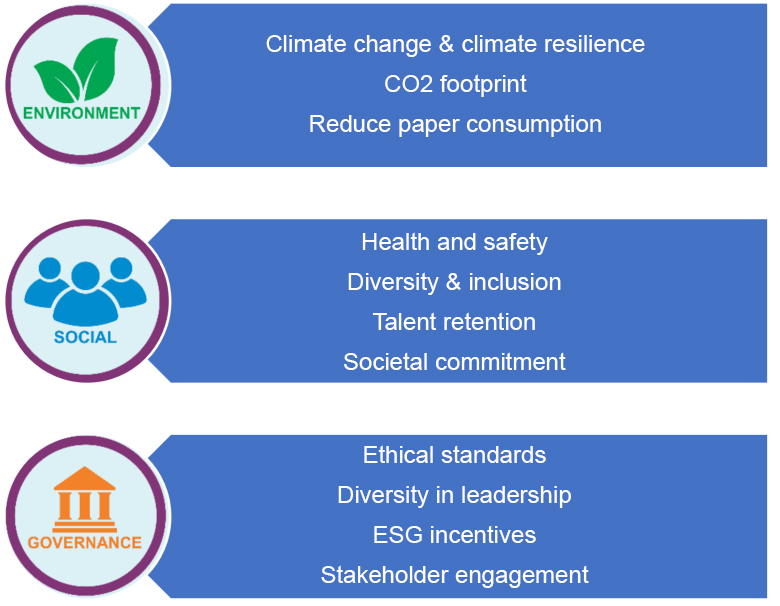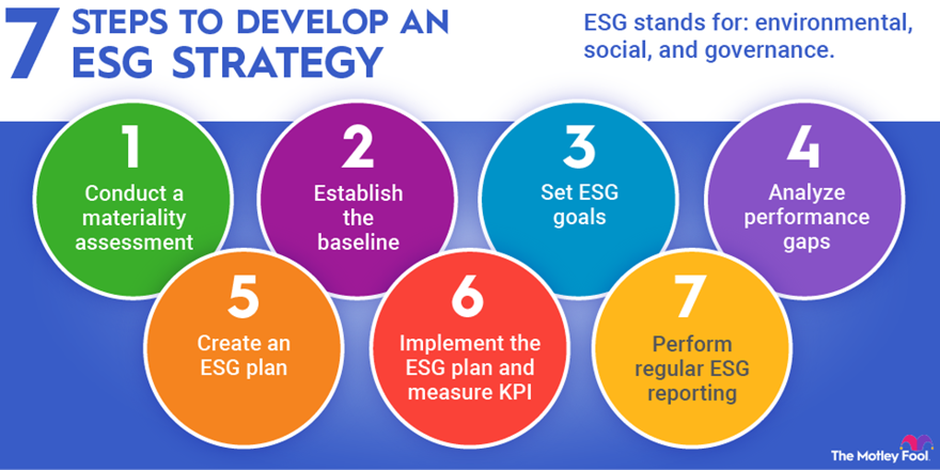
Environmental, Social, and Corporate Governance, commonly referred to as ESG – encompasses three core pillars which are considered by investors, clients, and employees to evaluate a company’s worth.
Upholding these pillars is essential to a company’s growth. Organizations that explicitly state their strategies to reduce waste & pollution and create a diverse and inclusive workforce at all company levels are more likely to succeed.

Let us first understand the ESG framework –
What are the three pillars of ESG?
- Environmental – this has to do with an organization’s impact on the planet
- Social – this has to do with the impact an organization has on people, including staff and customers, and the community
- Governance – this has to do with how an organization is governed

What are the KPIs for ESG?
Organizations usually define company-wide key performance indicators (KPIs) to monitor the achievement of objectives. These KPIs are consolidated regularly throughout the company and, as a rule, report at least once a year to the central ESG management committee.
How ESG Creates Value
Five critical factors link cash flow to ESG:
- optimizing costs
- increasing employee productivity
- minimizing regulatory and legal interventions
- optimizing investment and capital expenditures and
- facilitating top-line growth
Incorporating ESG principles into an organization’s day-to-day operations is a journey that demands a strong commitment, dedication, and adaptive corporate culture. The effective execution of ESG initiatives requires a balanced focus on the three pillars. Much of the emphasis towards implementing ESG has been placed on “E” – the environmental component. While it is undoubtedly essential to ensure that businesses are taking steps toward protecting the environment, an effective ESG strategy requires a holistic approach to achieve its full potential. The “S” and “G” (social and governance) are as integral for the initiative’s success.
With societies becoming inclusive, businesses are expected to uphold their social responsibilities. As a result, anti-discrimination practices, equity laws, and other inclusive practices are paving the way for the “S” to garner more attention.
ESG encourages companies to focus on good corporate governance “G” by adhering to ethical standards and practices when deciding how the company will operate.
There are a few ways that ESG can be positively implemented into the business. First, begin by reviewing the existing ESG policies and strategies, ensuring they are up-to-date with the latest trends and approaches. Also, auditing current ESG initiatives is important, ensuring goals and objectives are met.
Having ESG at the forefront of corporate decision-making helps ensure everyone is on board for a sustainable future.

ESG Commitments and Roadmap Development
The ESG roadmap needs to be developed with defined commitments for targets and supporting KPIs
- Minimize direct environmental impact and carbon footprint
- Ensure a safe working environment and a diverse culture for your employees
- Nurture diversity and inclusion to improve employee skills and company attractiveness continuously
- Foster ethical behavior by providing training and robust compliance programs
- Select and engage with suppliers based on recognized ESG standards
- Promote a sustainable development mindset to motivate employees throughout the organization
ESG Adoption : Global corporate statistics
As of 2020, 88% of publicly traded companies, 79% of venture and private equity-backed companies, and 67% of privately-owned companies had ESG initiatives in place. [NAVEX Global]. And nearly one out of five (18.5%) small and mid-caps are using ESG standards, such as the UN SDG, GRI, or SASB. [Quoted Companies Alliance]
ESG has gone from being a niche market to being embraced by companies of all sizes—as per the key findings from recent research. Smaller, privately-owned companies are also making moves to adopt ESG to create a positive image for their clients, customers, investors, and stakeholders. Incorporating ESG principles can drive change and promote positive brand identity regardless of the size of the company, as many KPIs are already in place as part of the ISO/ISMS and CSR strategy.
At RMSI, we have been focused on implementing ESG with many actions:
- Best-in-class certifications and accreditations – CMMi level 5, ISO 27001, ISO 9001, ISO 14001, ISO 45001
- Enviable employer branding – consistently featured amongst the “top companies to work for” in multiple employer surveys such as ‘The Great Places to Work For,’ Aon Best Employers, NASSCOM & CII
- Track record of having implemented multiple large-scale geospatial mapping projects globally with most lean operating model
- LEED Platinum rated (Leadership in Energy and Environmental Design) green building – Hyderabad Office
- Focus on building resilience to combat disaster and climate risk by applying innovative methods and global best practices for our clients. Our focus service areas include urban risk, agriculture risk, earthquake, flood, windstorm hazard modeling, and property risk.
With the world facing a series of pressing environmental and societal challenges, the geospatial industry could play a pivotal role in enabling high living standards. By working together, organizations across the industry can improve the quality of their products and services, helping to shape a more sustainable world for global communities.
So let’s take a step forward now!